Admiral Sir Tony Radakin used his final public speech as Chief of the Defence Staff to deliver one of his bluntest assessments yet of Russia’s strategic position, telling an audience in Washington that “Putin doesn’t want a war with NATO. He can’t even win a war against Ukraine.â€
Speaking at the Centre for Strategic and International Studies, Radakin said Russia’s prolonged conflict had forced the Kremlin into an economic corner. “Russia has had to shift its economy to a war effort, which it will be incredibly hard to row back from,†he noted.
He described President Putin’s situation as a stark choice: “Agree a ceasefire with his stated aims incomplete and little to show his people in return for the lost blood and treasure; or continue the war indefinitely, and watch his country become even weaker and poorer chasing the false dream of subjugating Ukraine.â€
Radakin argued that Moscow’s increased reliance on sabotage and sub-threshold attacks was a sign of its inability to escalate directly. “The very reason Russia is pursuing sub-threshold attacks against us is because Russia is unwilling and unable to do so through more overt means,†he said. While warning that “Russia is more dangerous because she is weakerâ€, he also stressed that the Kremlin has “more cause to be fearful of an Alliance of 32 than the other way around.â€
Rejecting an overly defensive posture, Radakin said he was “wary of too great an emphasis on homeland defence, or a fortress Europeâ€. Instead, he called for a forward-leaning NATO strategy: “We need to defend forward. The policy of NATO is to deter. And we deter by demonstrating to Russia that we are stronger, that we are ready to fight, and that we will beat them.â€


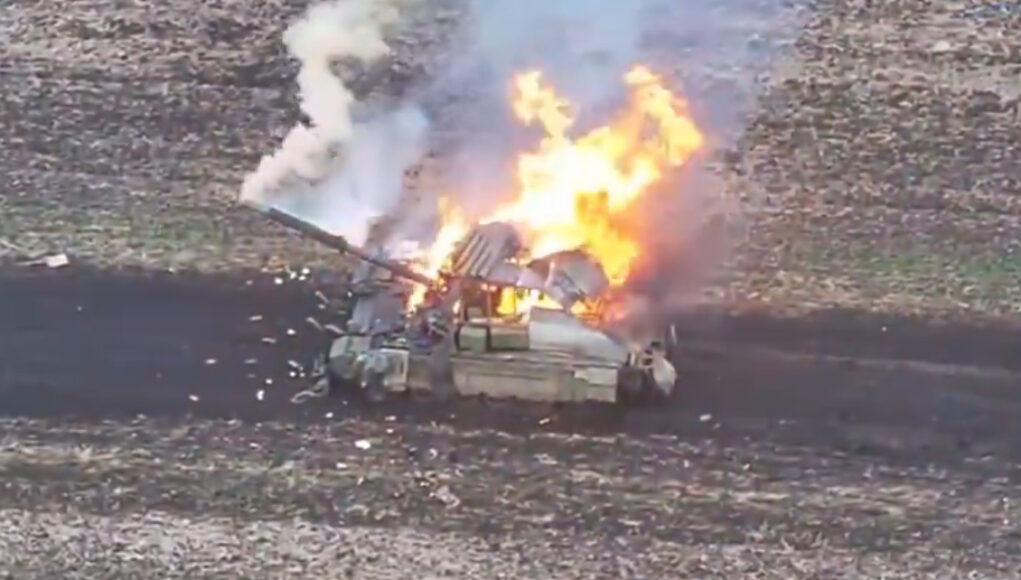
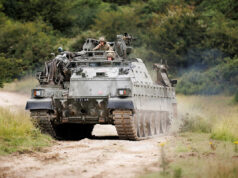
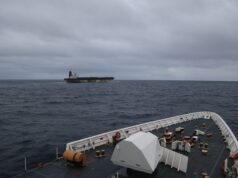
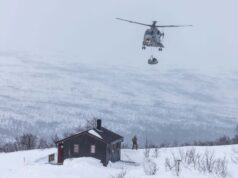

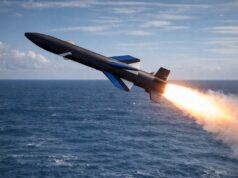
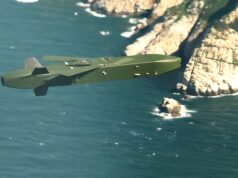


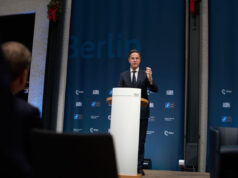
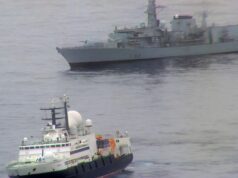

Hi George — are we friends again, or still on your naughty list?
How long would are ships last with Russia’s Mach 9 hypersonic missiles (3M 22 Zircon), defence is sea viper up to Mach 4.5 ?
Would are?
I think it’s easy to see that he meant to say “Our”. It’s very easy to miss if you don’t have a spell checker, we’ve all done it.
I think Trump just answered for everyone, as poohtin says he kill Ukrainians for their good.. Brotherly love. Slava Ukraine.
Firstly they would need to find our ships. Its actually not that easy once they are at see as we have layered defence. Hypersonic missiles in Russian hands are highly overrated ans accuracy using Russian kit is subjective at best.
Perhaps China’s Mach 5 missiles might find a target as their tech is advancing rapidly.
At see???
You can see it was a typo. Seriously grow up.
OK. Wall do.
The ships are alongside. Not exactly hard to find
It’s literally meaningless how fast or large a missile is if you cannot find, Fix, Track, Target and Engage the target.. and Russia has evidenced its pretty rubbish at all of those..
Yawn, as they are relying on glide bombs (mach 0) and Iranian prop drones I dont think anyone has much to worry about.
A missile at Mach 9 will be basically blind & unlikely to be able to hit a moving warship at that speed. So it likely has to slow down in its terminal phase to something closer to Aster’s top speed.
Mo likely about it, definitely. A Zircon will be under Mack 4 at sea skimming height. Hypersonic weaponry adds 1 thing, small warning time from launch/detection to arrival on target, nothing more. If I was a warship at sea I would be far far more worried about some firing an LRASM at me than a Zircon.
Although Radakin may be correct, I don’t think his comments are very useful. Far better to emphasise the galvanising effect Putin war has had on NATO, enlarged and committed to increased defence spending. The Kremlin will take no notice of anything he says, but there is a wider Russian audience which could be influenced away from its habitual paranoia by a more nuanced message.
Yes, it’s a strange thing for Radakin to say even if he actually believes it (you never know with Radakin). It gives Starmer the out of spending big money on defence that he’s undoubtedly looking for.
I think the key takeaway is deterrence is achieved by having forces forward deployed to strike Russia, rather than investing in things like UK theatre standard missile defence. That Russia fears NATO retaliation rather than our defensive capability..
As always the west misses the point…
Sub kinetic attacks are not a sign of weakness Russia and especially China consider all types of sub kinetic attacks( or political warfare) as fundamental important, infact especially China goes so far as to essentially consider kinetic warfare as an adjunct to political sub kinetic warfare.. only the west has this bizarre binary notion of peace and war.. to China and Russia peace is war.
Secondly seeing Russia as a singular threat. Russia is not going to up and invade Baltic state off its own back had be the focus of the entire western world. Russia will nip off a Baltic state via one of two routes
1) the political warfare route in which it uses the ethnic Russian population to destabilise the government.. what can NATO do if a Baltic state falls into civil war or elects a pro Russian government and leaves NATO ?
2) as part of a wider world war… world wars are essentially a set of mass contagion of conflicts across the globe and the most likely trigger point will be China invading Taiwan between 2027-2035. When china invaded Taiwan it will suck essentially most of the USN into a western pacific bloodbath that will see the USN gutted even if it wins.. China will then call out all the other opportunists.. North Korea will move across the MDL, Iran will work to destabilise and essentially take Jordan so it can directly attack Israel, Russia will nibble the northern flank and a load of African dictators will use the fact the west is distracted to do what they will…
These are the two possible worse case scenarios that NATO races.. but he is correct in that fortress Europe does nothing to prevent those two outcomes.
Take note of the audience that Radakin was addressing.
The point is to undermine the Trump/MAGA line that Ukraine must negotiate because ‘Russia Stronk’.
MAGA is soaked in Russian propaganda (after all it helped Trump win) and Radakin is countering that.
I think this is rather wishful thinking. Putin may play part in a broader plan and try to test NATO’s coherence. Their nuclear arsenal seems to be in a better shape than ours (except the US) and he might use it as a psychological warfare tactic alongside hybrid attacks. Our armed forces are in a poor state at the moment and he might be tempted to take advantage of this fact.
Take advantage how exactly? Other than nuclear he has no threat at all to anyone in a conventional sense.
He doesnt have the trained troops, he doesnt have an air force that can operate outside of Russian air space, his Navy is falling apart please explain what Russia can do against any large trained and equipped military?
If he manages to take Ukraine which I agree he could with zero help from the west he will hit an absolute brick wall that is Poland, even without Nato they cannot take on the Polish military in a conventional war.
Russia has 10 times more trained troops that the UK, long range bombers, ballistic and cruise missiles; its industry can produce more tanks than NATO at much faster pace. For instance, Russia is producing about 250,000 artillery munitions per month. it is a big mistake to underestimate the Russians and their campaign in a broader context – China and Taiwan could be the next challenge. They have also some sympathisers in Europe too. There is no reason to be complacent!
You better cozy up to Trump… Which of course you already have
Spot on. And Putin knows it, which is why he will push the west as far as he can on Ukraine, then claim victory and take the glory of his ‘grateful’ people.
I mean spot on James not Filip.
than the UK .. sorry for the typo
Totally agree with James,this will be music to Starmers ears.All the big talk of hitting 3.5pc on defence spending was for the birds anyway and with Radakin making statements like this the lefties will lap it up.Really does not help.I will be amazed if we ever get to even 2.75pc in real terms
Radakin, same idiot that has watched the demise of the Royal Navy, while head of that same force. What a joy he is.
at last, bozo defence chief realises the obvious, he must be reading the tabloids !
I Russia’s missiles are as good as what the West have, they should have already wipep out all Ukrainian military bases. But, look, theirs are just like a shotgun shots, to whom it may concern volleys. Not precision strikes.
No wonder our Armed Forces shrank under his watch.
Arrogant and complacent doesnt cover it.